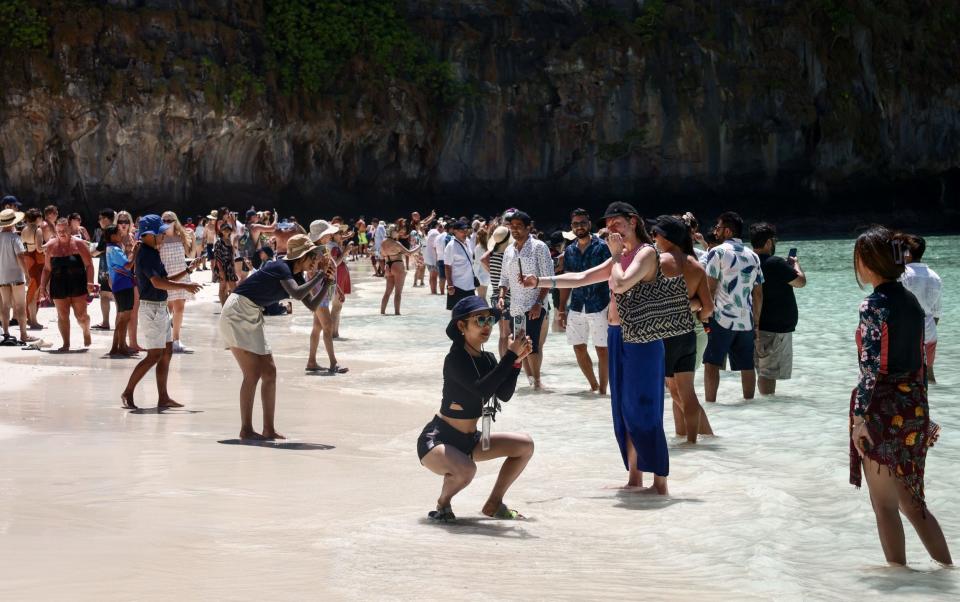Five years ago, in the summer of 2018, I traveled to Venice, Dubrovnik and the Isle of Skye to present a series of videos about a buzzword that seemed to whiz around relentlessly, like one of those spiky toys that European street vendors throw high into . the air to entertain our children. “Overtourism.”
The issues in these three destinations were varied, but there were shared themes. Environmental damage. The prices of the locals. Pollution. Overcrowding at bottleneck locations. Tourism didn’t seem to be working well.
But at all these destinations there was an overarching respect for the tourist. I remember talking to a man named Tommaso on the Venetian island of Sacca Fisola. His mission was to save Venice from overtourism, yet he didn’t have a bad word to say about the tourists themselves.
“It is not a respect problem if a young person does not have much money and eats a sandwich on the stairs. This,” he said, pointing to a giant arriving cruise ship, “this is a disrespect to the city.” It was their problem, not the tourists’, to solve.
But in 2023, the finger of blame has turned towards tourists in some destinations. And it’s not pointing at an old tourist, it’s pointing straight into the freckled nose of the British holidaymaker.
In Amsterdam, the ‘Stay Away’ campaign, launched earlier this year, trickled videos onto the screens of British boys as they looked for riotous trips to the city. They showed young, drunk men being arrested and fined. It was a blunt, transparent message from a blunt, transparent nation. Stay out. A two-word instruction that felt like a slightly less polite two-word instruction. Recent figures suggest it hasn’t worked quite as planned.


Meanwhile, Lanzarote’s president María Dolores Corujo said in March that the island should reduce its dependence on the British market and look for “higher quality holidaymakers who spend more when they are here”. Germans for example. The Balearic Islands’ new right-wing government has also unveiled plans to fine holidaymakers €36,000 (£31,000) if they are found guilty of the highly dangerous act of balconing (jumping from a balcony into a swimming pool), and will throw it away and possibly even ban British tourists if they behave badly next summer.
Are these targeted messages justified? I suppose if a guy came to my house and leered through the window before urinating on my front door, I’d probably ask him to “stay away” too. Or if my dinner guests were systematically ruining the atmosphere of my home with their football chants, demands for full Englishes and penchant for blue cocktails, I might also consider inviting mint tea-drinking continental intellects instead.
But the thing is, I don’t have a sex worker dancing outside my window (Lewes would disagree), and I don’t have a big sign outside my front door offering a free shot of absinthe with every serving . baked beans that you order.
I know the British tourist isn’t always the most stylish, nor always the best behaved, but it does feel like the focus should be on the product as much as the customer. Amsterdam is one of the few places in Europe where you can buy sex or cannabis casually and easily. You can also pay $300 for someone to “arrest” your friend at his bachelor party, if you want. Despite attempts to tone it down, the party industry continues to flourish in the Red Light District.


And Lanzarote may be focusing its attention on a superior breed of holidaymaker, but it still has entire swaths (Avenida de las Playas, for example) catering to the very British holidaymaker they are now apparently trying to keep away. I simply went to Street View and within five seconds found a bar with beer buckets and Sunday roasts.
British tourists aren’t the only ones causing mischief on holiday. According to our panel of experts, the Germans infuriate the Dutch by insisting on speaking German, the French find the Americans excruciatingly stubborn, and the Portuguese have few kind words to say about their Spanish neighbors. Antisocial behavior manifests itself in all kinds of ways.
And any conversation about Brits abroad is incomplete without a word about the seismic economic impact of our outbound holidaymakers. Last year, British residents made 71 million trips abroad (about one per capita) and spent more than £58 billion on their pleasures. We travel, especially to the Mediterranean, we spend money, and a small but very vocal minority of us cause trouble while we are away.
There have been numerous examples of sensible, non-inflammatory measures to control tourism in recent years. Last month, San Sebastian came out saying it would limit the number of new hotels it could open in the city, to ensure the city remains liveable for locals. In Maya Bay, Thailand, authorities closed the beach for three years between 2019 and 2022 (albeit made easier due to the pandemic) to allow the coral reef to recover. Florence has all but banned Airbnb to stem the city’s housing crisis. Seville obliged holiday homes to install noise meters to combat night-time nuisance. No one has pointed the finger at the tourist.


I’ve seen first-hand the impact mass tourism can have on destinations, and I understand why some tourism boards are tempted to follow the ‘stay away’ rule. But if you do that, you miss the core of the problem. It’s like planting a few cheap flowers in your garden and becoming so enraged by the bees that come to pollinate them every year that you spray-paint your own fence and spend your days trying to swat them away. If you want hummingbirds and butterflies, I’m afraid you’ll have to overhaul the entire flowerbed and sow the relevant seeds.